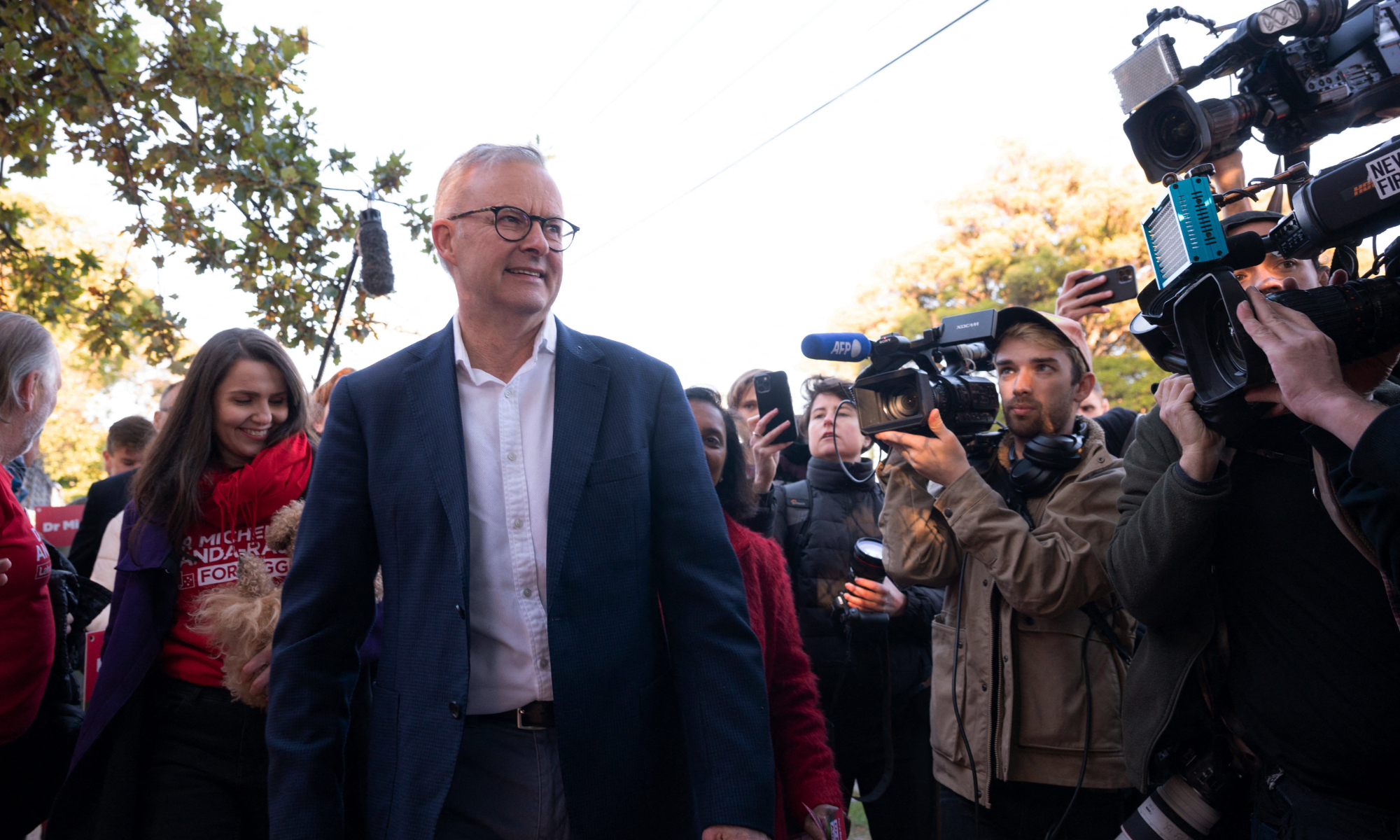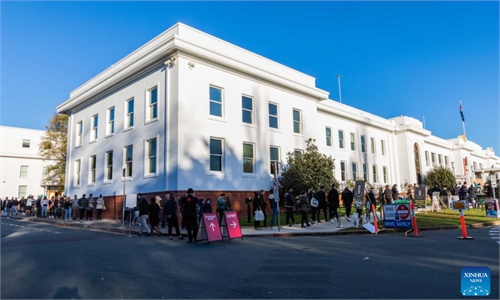
Australian Labor Party leader Anthony Albanese is forecast to win the election Saturday and will become Australia's next prime minister, local media reports. Photo:AFP
Shortly after Australia's Labor Party leader Anthony Albanese is sworn in on Monday, the country's new prime minister will head for Japan for a Quad summit where he will "renew" his acquaintance with US President Joe Biden and meet other leaders of the group including the Indian and Japanese prime ministers.
As the first event of importance after Albanese takes office, his attendance at the Quad summit - Quadrilateral Security Dialogue (Quad) comprising the US, Japan, India and Australia aiming at countering China - is expected to be the first test of the political wisdom of the new Australian government, especially on whether it could get rid of the shadow of previous Scott Morrison's anti-China strategy that deeply hurt its own economy and trade, some Chinese experts said. They noted that Australia has little sway in the US-led Indo-Pacific Economic Framework given its high dependence on China's economy.
However, experts hold a cautious attitude toward how much the new Australian leader's China policy will differ from Morrison's reckless moves that served the US' strategic interests. Especially in South Pacific island countries, the new Australian government is highly likely to invest more in competing with China. But smearing China's cooperation with those countries or distorting it as a "China' threat" would not change the course of the equal and reciprocal cooperation between China and Pacific island countries, experts said.
First thing on the agenda
As Australia's Labor Party will form the country's next government on Monday, five members of the party will be the first ministers to be sworn in ahead of the Quad summit, including Penny Wong as foreign minister, Richard Marles, the likely defense minister, Katy Gallagher as finance minister and Jim Chalmers as treasurer, Sky News Australia reported on Sunday.
Albanese will travel to Tokyo alongside Wong to meet Biden, Japanese Prime Minister Fumio Kishida and Indian Prime Minister Narendra Modi, and the newly elected prime minister is expected to take a $470 million South-East Asia foreign aid package to the Quad to highlight his government's focus on the region, according to the media report.
Attending the Quad summit on the second day after Albanese takes the office could be a challenge for the new government given his little experience in diplomacy, experts said. "If the new prime minister is smart enough, he would adopt a cautious rhetoric and avoid putting the role of Australia under the spotlight, otherwise, it would only serve as a bad beginning for Australia-China relations under the new government," Zhou Fangyin, a research fellow at the Guangdong Institute for International Strategies, told the Global Times on Sunday.
Albanese prioritized the Quad summit after taking office rather than addressing a number of severe domestic issues such as rising inflation and cost of living pressure first, which shows that whether the new government plans it or not, as a pivot of the Quad mechanism, Australia cannot afford to withdraw or act passively on the mechanism given the US pressure, experts said.
"But it's believed that Albanese won't take the lead in the US-led bloc like Morrison did, as the new government will focus on economic recovery and tackle unemployment and social livelihood issues," Yu Lei, chief research fellow at the Research Center for Pacific Island Countries of Liaocheng University, told the Global Times on Sunday.
When Morrison met the Quad leaders in September 2021, the first in-person meeting in Washington, some Australian media said Australia "gets serious about tempering China's strength," adding that "it's clear the alliance has become a de facto security mechanism to manage China's rise."
Following the victory, Albanese said he wants to unite the country, and that he thinks people have had enough of division. He promised to give more financial assistance to build a stronger social safety net, Sky News reported on Saturday.
On the foreign policy front, the Labor Party proposed to establish a Pacific defense school to train neighboring armies in response to China's presence on the Solomon Islands, which are on Australia's doorstep, the UK media said.
Albanese has stressed the importance of the Australia-US alliance both before and after the election. By meeting US President Joe Biden face to face at this event, Australia will show more commitment to the Quad mechanism, which is also a way to emphasize that the new leader will not deviate from the general direction of the previous administration, Chen Hong, president of the Chinese Association of Australian Studies and director of the Australian Studies Center at East China Normal University, told the Global Times on Sunday.
It has also been luring India not only for the sake of AUKUS, but also for its intention of decoupling from China, although the overall trade volume between Australia and India is much smaller than China-Australia trade, Chen said.
Influence in South Pacific
Still there have been voices calling for Australia to repair the damage with its largest trading partner when it is also expected to seek more progress in ties with Pacific island nations, experts said.
Like Morrison, Albanese has accused China of acting more aggressively in the region, and he has said Australia needs to respond to that. He also criticized Morrison's government for not doing enough to prevent China from signing a security pact with the Solomon Islands, an island nation northeast of Australia where Canberra has traditionally been a key provider of security, the Wall Street Journal reported on Saturday.
The Financial Times also reported on Saturday that China is intensifying its drive for influence in the Pacific by negotiating security deals with two other island nations including Kiribati following the pact with the Solomon Islands, citing officials in the US and allied countries.
Australia has always regarded the South Pacific region as its own backyard and an exclusive sphere of influence. Therefore, it always misinterprets any kind of cooperation welcomed by the local people as a "military threat" and hypes up the issue, especially during the election campaign, the Morrison administration has continuously raised the issue as a proof of the "China threat," Chen noted.
The Morrison government had taken a coercive approach to intimidate Pacific countries by bombarding them with government officials, threatening them in public opinion, and even threatening to send in troops, the Chinese expert said.
"Although it's uncertain whether the Labor Party-led government would change that approach or not, its intention to interfere in the cooperation between China and those countries will always be there," Chen added.


